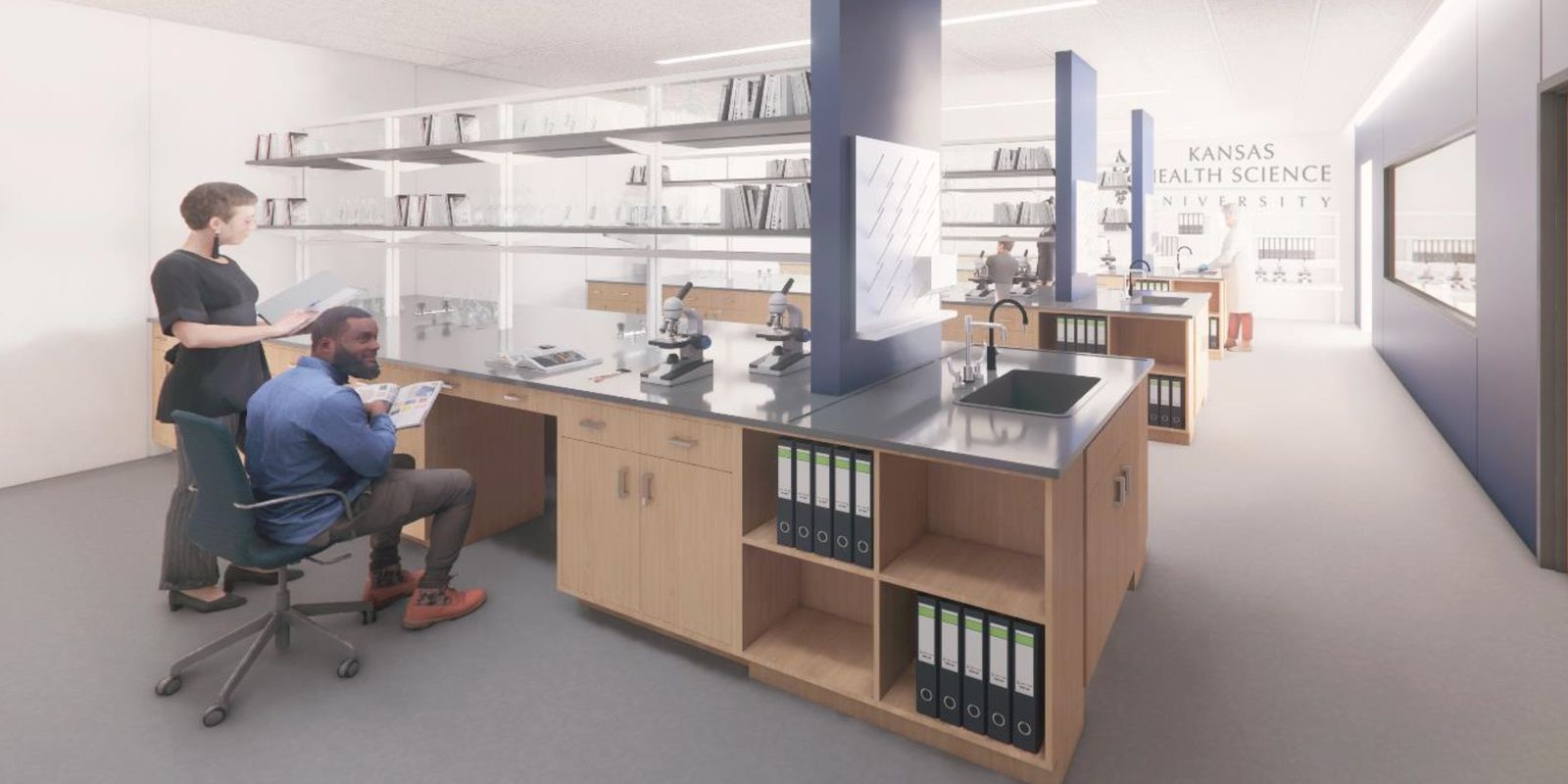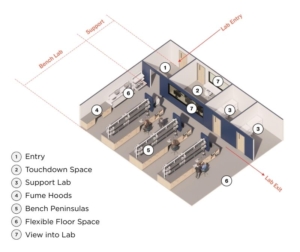In its first major capital construction project since opening its doors to students in 2022, Kansas Health Science University (KHSU) is working toward the development of a biomedical science laboratory that will enhance institutional research capabilities.
The university is currently seeking bids for shell construction of the $2.3 million project, which is planned for the third floor of the KHSU campus in Wichita. Contingent on fundraising goals, construction could be completed as early as October 2027.
KHSU President and CEO Tiffany Masson, Psy.D., says, “This is one of many first-steps toward Kansas Health Science University becoming a comprehensive center for health science education in step with our flagship osteopathic medical school.”
The interdisciplinary space, designed with input from experienced lab architects and internal and external faculty experts, will support research in pathology, physiology, biochemistry, pharmacology, and more, providing large workstations, hoods, and water hookups.
A Gift That Gives Back and Moves Medicine Forward
Plans for a lab to accommodate bench research at the Kansas College of Osteopathic Medicine (KansasCOM) had long existed, director of philanthropy Beth Sturm says, but it’s thanks to the Community Service Program (CSP) Tax Credits through the Kansas Department of Commerce that the university is able to pursue the project now.
KHSU is leveraging the state tax benefit, allowing donors to receive 50% of their contribution back through income tax reduction, effectively multiplying the impact of each donation.
“The intention behind the community service tax credits is to help nonprofits expand, especially in areas like health care and education,” Sturm says. “The tax credit helps donors make a bigger impact than they thought possible. While they receive half their donation back, we benefit from the full gift.”
Contributing to the biomedical science laboratory project, Sturm says, gives community members a direct role in advancing education and research. The lab will be a dynamic environment for collaborative studies within downtown Wichita’s emerging biomedical corridor. It will also help attract and retain exceptional talent at KansasCOM and open new pathways to critical research grant opportunities.
Building Better Doctors Through Research
At KansasCOM, every first-year medical student is required to complete a research project, forming foundational analytical skills and opening the door to innovation. The biomedical science laboratory will strengthen their hands-on learning opportunities and position research-oriented students for more competitive residencies.
According to David Shubert, Ph.D., institutional effectiveness, assessment, and research officer, the lab space will enable students to go beyond the literature reviews most commonly conducted today, which include examining and summarizing existing research on a particular topic with a goal of providing an overview of what is already known.
Dr. Shubert says, “At the end of all those literature review projects is the question, ‘How can we take this forward?’ With the right tools in place, students could someday explore cancer cell behaviors, drug interactions, or immune response mechanisms right here on campus.
“Anything that involves bench chemistry, such as mixing reagents, isolating cells, or investigating the mechanisms of cellular behavior, could be done in our future lab,” he adds.
Conducting research as a student can also improve residency applications, Dr. Shubert explains. Research publications are a significant factor programs consider when selecting residents, especially in competitive specialties, he says.
In addition to expanding students’ own research capabilities, the future lab will also serve as a hub for community-centered research conducted through the Kansas Education and Research Network (KERN), the university’s practice-based research network that connects students with practicing clinicians and professionals. By striving together to advance patient care, students, clinicians, and donors can make a meaningful impact on the future.
Sturm says, in five years’ time, she hopes to walk with benefactors in the bustling laboratory they helped to create in service of providing quality doctors to the populations that need them most.
“It all goes back to our mission,” Sturm says. “We have over 700 primary care vacancies in Kansas. And this laboratory is a critical investment in providing exceptional medical education for our students. We want our students to have research experience now that will later translate to better care for patients throughout Kansas and beyond.”
To learn more about how you can support medical research at KHSU, and how to take advantage of the limited-time CSP Tax Credits, contact the Office of Institutional Advancement.


